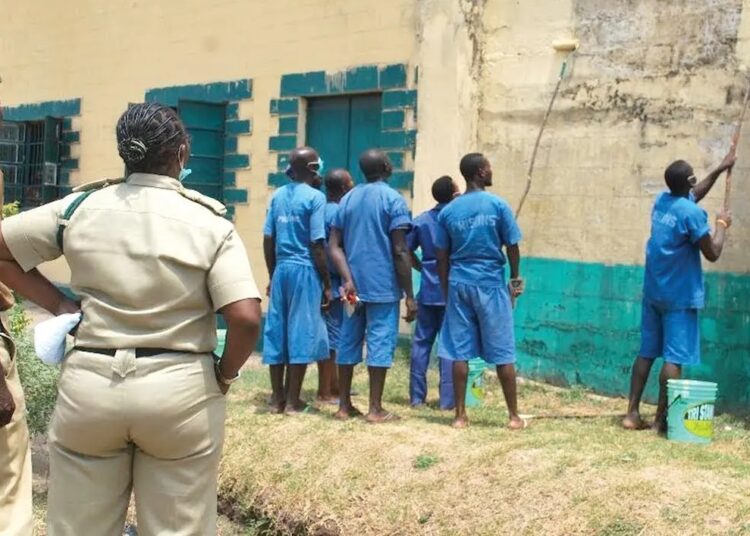A system that holds nearly 49,000 citizens in limbo betrays fundamental human rights.The revelation that 48,932 inmates languish in Nigeria’s correctional facilities awaiting trial represents more than just a statistic – it is a damning indictment of our criminal justice system.
With over 60 percent of these individuals facing non-bailable charges, the situation has transcended a mere administrative challenge to become a full-blown humanitarian crisis that demands immediate intervention from all stakeholders in the justice sector.
The Nigerian Correctional Service (NCoS’) desperate plea for intervention from the Inspector-General of Police, the Chief Justice of Nigeria, and the Attorney-General underscores the severity of this crisis.
When the Acting Controller-General, Sylvester Nwakuche, raises an alarm about the fate of these inmates, he points to three critical issues: their upkeep, the conditions of custodial centres, and security concerns.
These are not mere operational challenges but fundamental problems that strike at the heart of human dignity and constitutional rights.
The implications of this crisis are far-reaching. First, there is the human cost – thousands of individuals, some of whom may be innocent, are confined in overcrowded facilities for indefinite periods without their day in court.
This situation not only violates their constitutional right to a fair and speedy trial but also exposes them to the psychological trauma of prolonged incarceration.
Second, there is the economic burden on the state, which must bear the cost of maintaining these inmates without any clear timeline for the resolution of their cases.
More troubling is the fact that this backlog of cases creates a perfect storm for the breakdown of order within these facilities. The NCoS’s concerns about escapes, riots, and attacks are not unfounded. When hope for justice is repeatedly deferred, desperation sets in, and the risk of violent incidents increases exponentially.
The recent history of jailbreaks across the country bears testament to this dangerous correlation between overcrowding, delayed justice, and security breaches.
While the construction of new 3,000-capacity modern custodial facilities, as mentioned by the NCoS boss, is a step in the right direction, it is merely treating the symptom rather than the disease.
In the considered opinion of this newspaper, building more prisons without addressing the fundamental issues of delayed trials and inefficient case management is akin to expanding a hospital without treating the epidemic that fills its wards.
A comprehensive remedy for this calamitous situation cannot rely on piecemeal solutions. It demands a radical reengineering of our criminal justice architecture at multiple levels.
First, there must be a comprehensive review of the criminal justice system’s efficiency. The judiciary needs to adopt modern case management techniques and possibly establish special courts dedicated to clearing the backlog of awaiting-trial cases.
The deployment of technological solutions, as proposed by the NCoS, should extend beyond custodial management to the entire judicial process.
Second, there is an urgent need to expand the application of non-custodial measures such as parole and community service. These alternatives to imprisonment, especially for minor offences, could significantly reduce the pressure on correctional facilities while ensuring that justice is still served.
The state executives and judicial authorities must show more commitment to implementing these measures.
Third, the role of the police and other prosecuting agencies needs serious scrutiny. The high percentage of awaiting-trial inmates suggests either overzealous arrests or inefficient prosecution, or both.
The Inspector-General of Police Kayode Igbetokun must ensure that arrests are made only when there is sufficient evidence to prosecute, and cases are properly investigated before suspects are remanded in custody.
The Attorney-General’s office, both at federal and state levels, must also step up to its responsibilities. The constitutional power to initiate, take over, or discontinue criminal proceedings should be exercised more proactively to prevent the clogging of the justice system with cases that have little prospect of successful prosecution.
Furthermore, state governments must take greater responsibility for the administration of justice within their jurisdictions. The practice of abandoning inmates to their fate in federal correctional facilities while state authorities drag their feet on prosecution must end.
State judiciary authorities should conduct regular jail delivery exercises to review cases and grant bail where appropriate.
As a newspaper, we believe that the current situation in our correctional facilities is not just a failure of the justice system but a reflection of deeper societal issues that require urgent attention.
The right to justice should not be a privilege but a fundamental right that every citizen can count on, regardless of their social status.
The NCoS’s call for stakeholder intervention should serve as a wake-up call to all arms of government. The executive must provide the necessary resources, the legislature must review relevant laws to remove bottlenecks, and the judiciary must ensure swift dispensation of justice.
The time for mere expressions of concern is past. What we need now is concrete action to address this crisis. Every day that passes with these 48,932 inmates awaiting trial is another day that justice is denied, not just to them but to our collective conscience as a nation.





